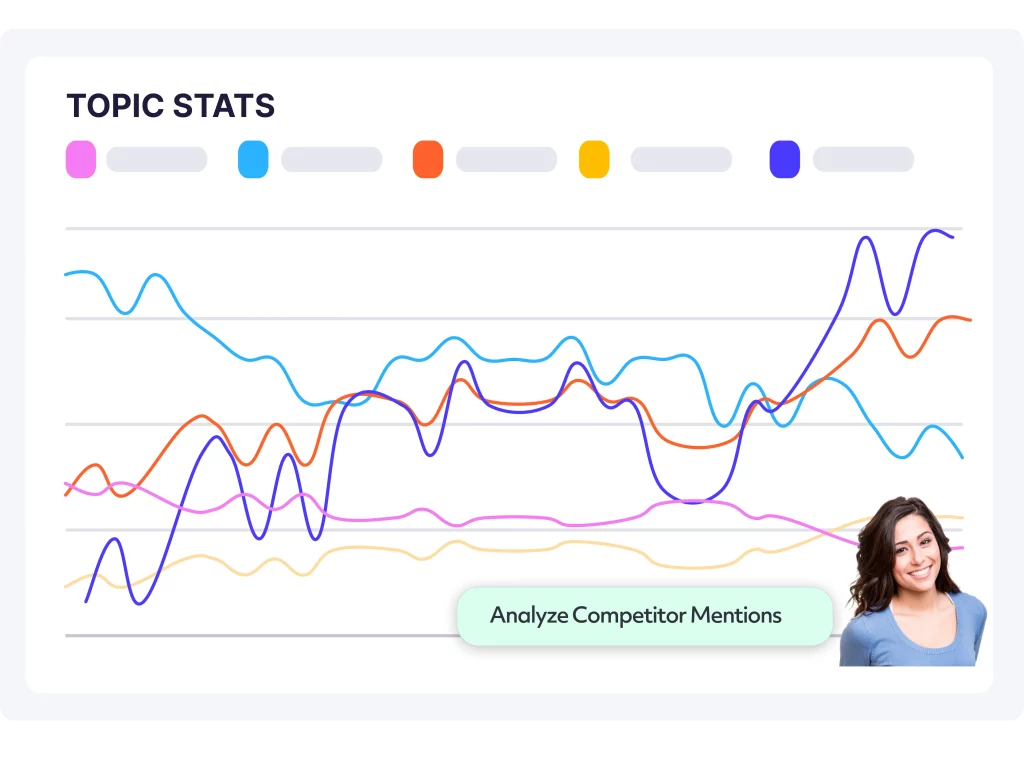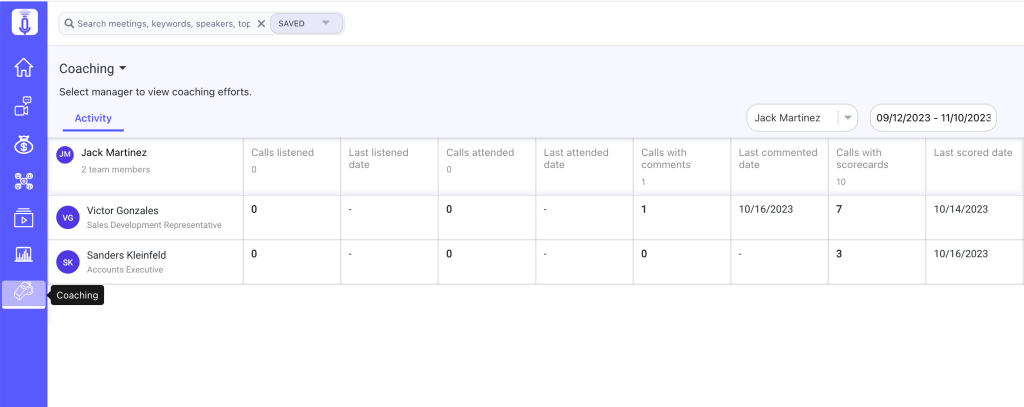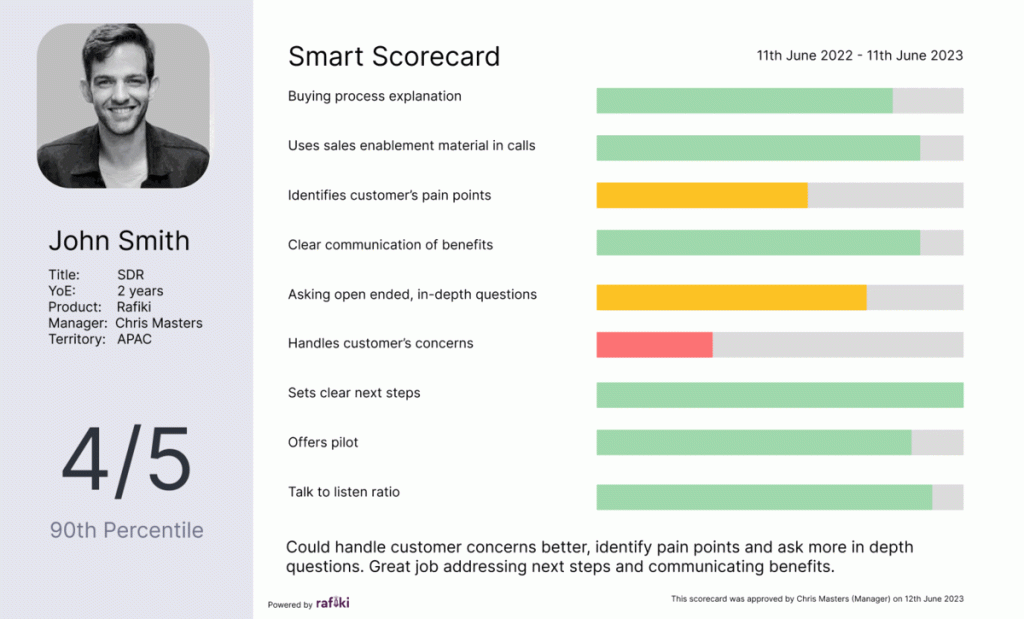Boost Sales Performance: Leveraging Data Analytics for Success
In the modern sales landscape, data has become an essential asset. A recent survey by Gartner found that organizations prioritizing data-driven strategies are nearly three times more likely to exceed their customer acquisition targets. Moreover, McKinsey reports that companies leveraging data and analytics in sales can generate up to 50% more revenue, emphasizing the significant impact of data-driven approaches. Data driven sales refers to the practice of using data to guide sales strategies and decisions. This approach involves collecting, analyzing, and leveraging data to understand customer behavior, forecast trends, and make informed decisions. This method empowers sales teams to target the right prospects, personalize interactions, and ultimately close more deals.
The purpose of this blog post is to delve into the concept of data driven sales. We will explore how data analytics can transform sales strategies, improve decision-making, and drive better sales performance. From understanding different types of sales data to implementing advanced tools and techniques, this guide will provide you with the insights needed to harness the power of data in your sales process.
Understanding Data Driven Sales
Definition of Data Driven Sales
Data-driven sales use data to inform and guide sales strategies and decisions. This method relies on empirical evidence rather than intuition, allowing sales teams to make informed choices based on real-time data and trends.
Evolution of Sales Strategies
Traditional sales strategies relied heavily on intuition and personal experience. Sales reps would use their judgment to decide which leads to pursue and how to approach potential customers. However, the introduction of digital tools and data analytics has revolutionized this approach. Modern sales strategies are now heavily data-driven, utilizing customer data, sales metrics, and market trends to make informed decisions. This evolution has led to more precise targeting, efficient processes, and improved sales outcomes.
Benefits of Adopting a Data Driven Sales Approach
Improved Decision-Making: Data-driven sales provide clear insights into customer behavior and preferences, enabling sales teams to make better decisions.
Enhanced Customer Targeting: By analyzing data, sales teams can identify high-value prospects and tailor their approach to meet specific needs.
Increased Sales Efficiency: Automation of routine tasks and data analysis helps streamline sales processes, allowing reps to focus on high-impact activities.
Higher Conversion Rates: Targeted strategies based on data insights lead to more effective sales pitches and higher conversion rates.
Better Forecasting: Predictive analytics enable sales teams to forecast trends and prepare for future opportunities, ensuring they stay ahead of the competition.
By adopting a data-driven sales approach, organizations can enhance their sales performance, optimize their strategies, and achieve better results.
Types of Data in Sales
Sales teams utilize various types of data to inform their strategies. Understanding these data categories is crucial for effective sales planning and execution.
Customer Data
Demographics: This includes information like age, gender, and location. Knowing demographic details helps in tailoring marketing messages and sales pitches to specific customer segments.
Behavior: This involves tracking interaction history and purchase patterns. Understanding customer behavior provides insights into their preferences and buying journey, enabling more personalized and timely engagements.
Sales Data
Metrics: Key performance indicators such as conversion rates, average deal size, and sales velocity. These metrics help in assessing the effectiveness of sales strategies and identifying areas for improvement.
Pipeline: Details about the stages of the sales funnel and the movement of prospects through these stages. Analyzing pipeline data helps in forecasting sales and managing resources efficiently.
Market Data
Trends: Information on market shifts and seasonal changes. Keeping track of market trends helps in adjusting strategies to meet current demands and capitalize on emerging opportunities.
Competition: Analysis of competitors’ strategies, market positions, and performance. Competitive analysis is vital for understanding market dynamics and identifying unique value propositions.
Each data type offers unique insights. Together, they provide a comprehensive view of the sales landscape, enabling informed decision-making and strategic planning.
Tools and Technologies for Data Analytics in Sales
Effective data-driven sales rely on the right tools. Various technologies help sales teams collect, analyze, and utilize data effectively.
Customer Relationship Management (CRM) Systems
CRMs store and organize customer information, tracking interactions and managing relationships. Popular CRM systems like Salesforce and HubSpot provide a centralized platform for managing customer data.
Sales Analytics Platforms
These platforms analyze sales data, providing insights into performance and trends. Tools like Rafiki, Clari and InsightSquared help sales teams monitor key metrics and improve decision-making.
Data Visualization Tools
Visualization tools like Tableau and Power BI make complex data easy to understand by transforming it into visual formats such as charts and graphs. This helps sales teams quickly identify patterns and insights.
AI and Machine Learning
AI tools predict trends and automate data analysis. Machine learning algorithms can identify patterns in customer behavior and sales performance, providing predictive insights that enhance decision-making. Tools like Einstein Analytics and Microsoft Dynamics 365 use AI to offer advanced analytics capabilities.
Using these tools, sales teams can harness data effectively, transforming raw data into actionable insights that drive sales performance.
Collecting and Managing Sales Data
Proper data collection and management are foundational to effective data-driven sales. Ensuring data quality and accuracy is critical for reliable analysis and decision-making.
Best Practices for Data Collection
- Use Reliable Sources: Ensure that the data is gathered from trustworthy and accurate sources.
- Collect Data Consistently: Implement a standardized process for regular data collection.
- Validate Data Regularly: Regularly check the data for accuracy and completeness.
Ensuring Data Quality
- Clean Data to Remove Errors: Identify and correct inaccuracies or inconsistencies.
- Standardize Formats for Consistency: Use uniform data formats to facilitate easy analysis.
- Update Data Regularly: Keep the data current to ensure it reflects the latest information.
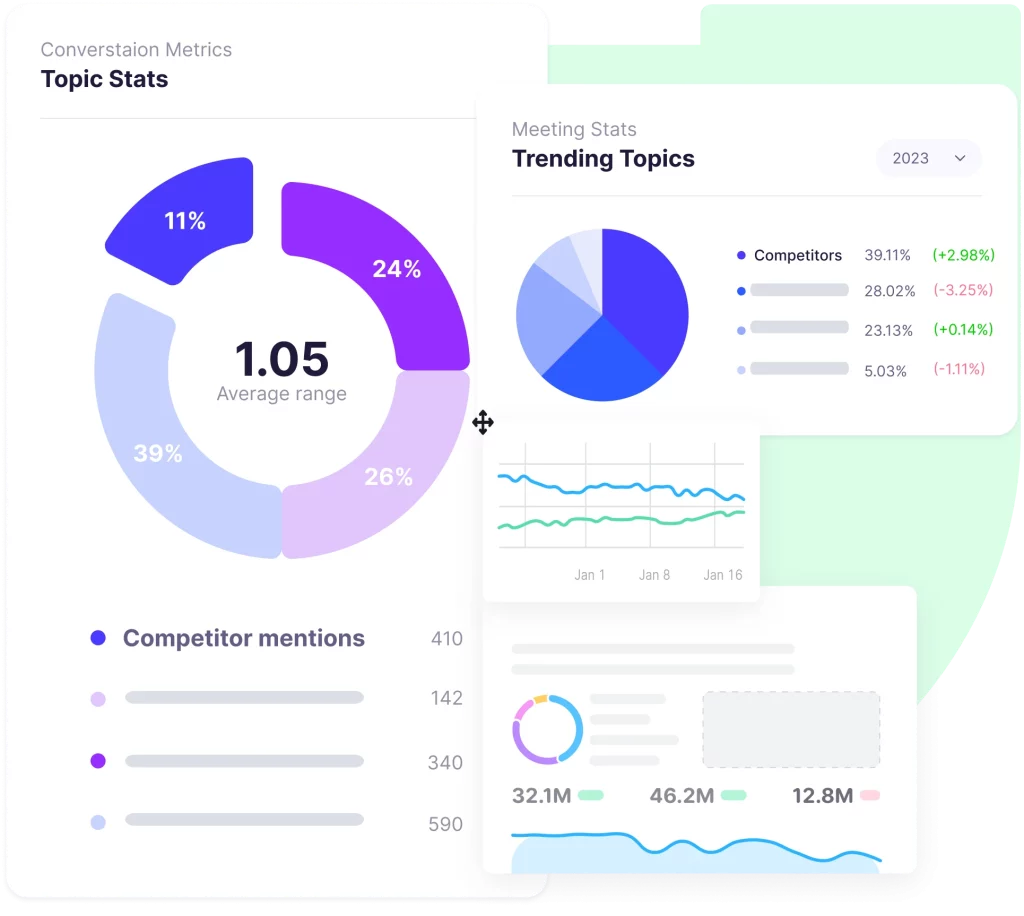
Data Storage and Management:
- Use Secure Databases: Store data in secure, reliable databases to protect against breaches and loss.
- Ensure Easy Access for Analysis: Make sure that data is easily accessible for analysis by authorized personnel.
- Maintain Data Privacy and Compliance: Adhere to data privacy regulations and best practices to protect sensitive information.
Following these practices ensures the collection of high-quality data, which is essential for accurate analysis and effective decision-making in sales strategies.
Analyzing Sales Data
Analyzing sales data is crucial for transforming raw information into actionable insights. Different types of data analytics provide various perspectives and benefits, helping sales teams make informed decisions.
Descriptive Analytics
- Reviews Past Sales Performance: Descriptive analytics involves summarizing historical data to understand past sales activities and outcomes. This type of analysis helps in identifying what has happened over a specific period.
- Identifies Trends and Patterns: By analyzing past sales data, descriptive analytics can reveal recurring trends and patterns, such as seasonal fluctuations in sales or the performance of different sales strategies.
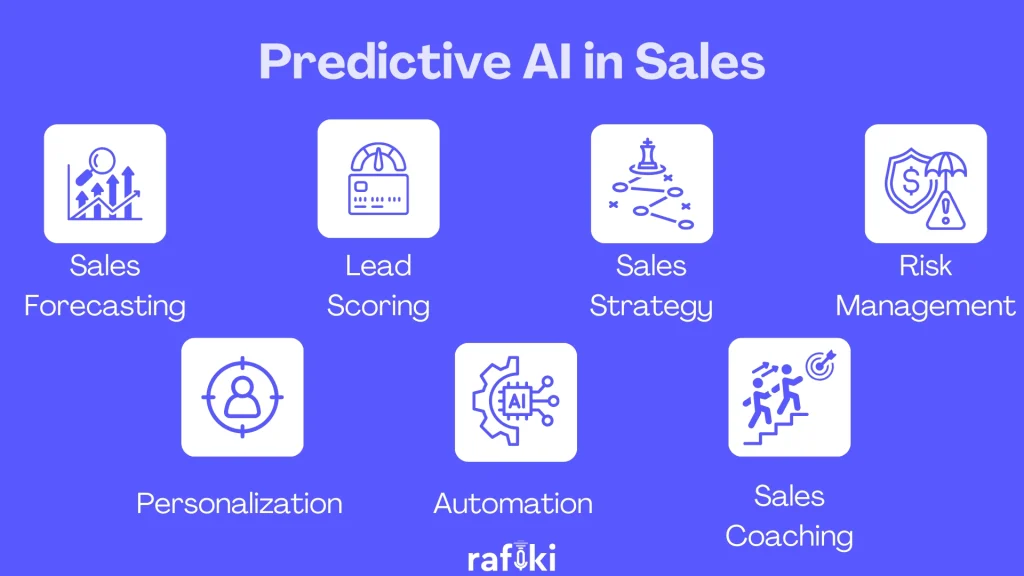
Predictive Analytics
- Forecasts Future Sales: Predictive analytics uses historical data to make informed predictions about future sales. This involves using statistical models and machine learning algorithms to forecast sales trends, helping businesses anticipate future demand.
- Identifies Potential Leads: This type of analytics helps in scoring leads based on their likelihood to convert. By analyzing data on past customer behaviors and attributes, predictive models can identify high-potential prospects, allowing sales teams to prioritize their efforts effectively.
- Recommends Actions to Improve Outcomes: Prescriptive analytics goes beyond predicting future outcomes by suggesting specific actions to achieve desired results. It uses optimization algorithms to provide recommendations on the best strategies and actions.
- Optimizes Sales Strategies: By analyzing various data points and considering multiple scenarios, prescriptive analytics can help in fine-tuning sales strategies. This ensures that sales efforts are aligned with the most effective methods to achieve targets and improve overall performance.
Integrating Different Types of Analytics
- Each type of analytics provides unique insights. Descriptive analytics offers a historical perspective, predictive analytics forecasts future trends, and prescriptive analytics suggests the best actions to take. Together, they provide a comprehensive view of sales performance and potential.
- For instance, a sales team might use descriptive analytics to understand past performance trends, apply predictive analytics to forecast upcoming sales periods, and utilize prescriptive analytics to determine the best strategies to boost future sales.
By leveraging these different types of data analytics, sales teams can make data-driven decisions that enhance their effectiveness, optimize their strategies, and ultimately drive better sales outcomes. This integrated approach ensures a holistic understanding of the sales landscape, leading to more informed and strategic decision-making.
Applying Data Insights to Sales Strategies
Data insights can significantly enhance sales strategies, helping to personalize interactions and optimize efforts for better outcomes.
Personalizing Customer Interactions
Use customer data to tailor communications. Personalized messages increase engagement and conversion rates by addressing specific needs and preferences.
Identifying High-Value Leads
Data can highlight which leads are most likely to convert. Focus efforts on these high-value prospects to maximize sales efficiency and effectiveness.
Enhancing Cross-Selling and Up-Selling
Analyze purchase history to identify opportunities. Suggest relevant products or upgrades to existing customers, increasing revenue per customer.
Improving Sales Team Performance
Use data to identify skill gaps and areas for improvement. Provide targeted training and support to enhance overall performance with Rafiki.
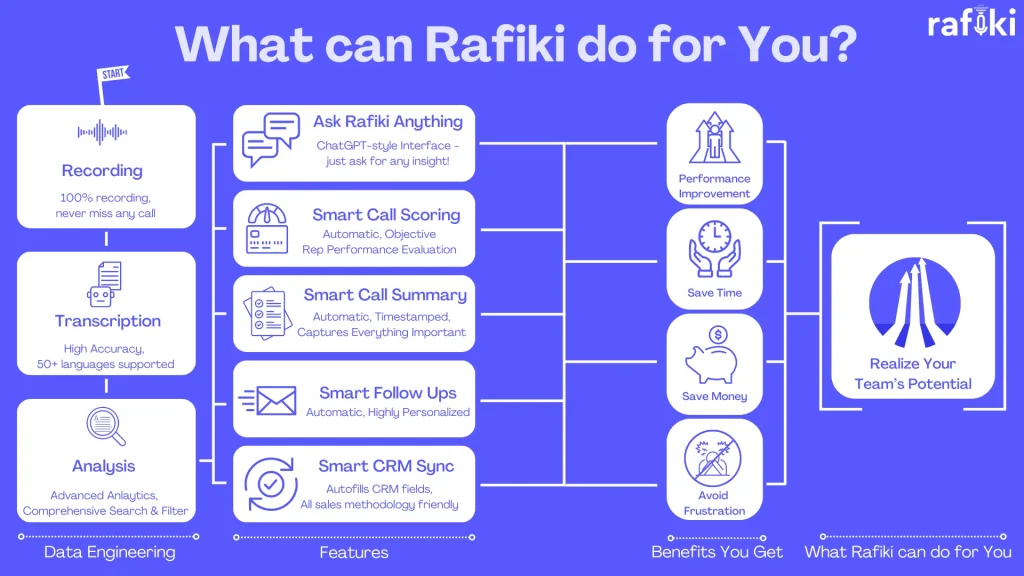
By applying these data insights, sales teams can refine their strategies, leading to better outcomes and higher sales.
Wrapping Up
Leveraging data analytics is essential in modern sales. Understanding customer, sales, and market data provides a comprehensive view of the sales landscape. Tools like CRM systems, analytics platforms, and AI help in collecting and analyzing data effectively.
Ensuring data quality through consistent collection, regular validation, and secure storage is crucial. Different types of analytics—descriptive, predictive, and prescriptive—offer unique insights that improve decision-making and strategy optimization.
Boost Sales Performance
By applying data insights, sales teams can personalize interactions, target high-value leads, enhance cross-selling, and improve performance, leading to better sales outcomes and increased efficiency. Embracing data-driven sales strategies drives growth and enhances customer satisfaction.
